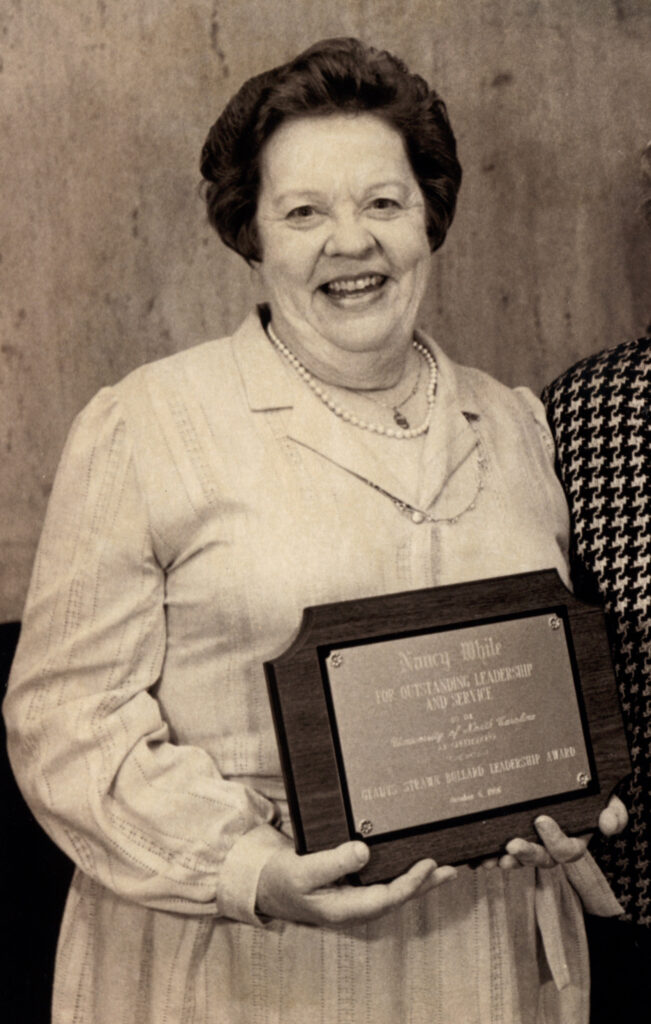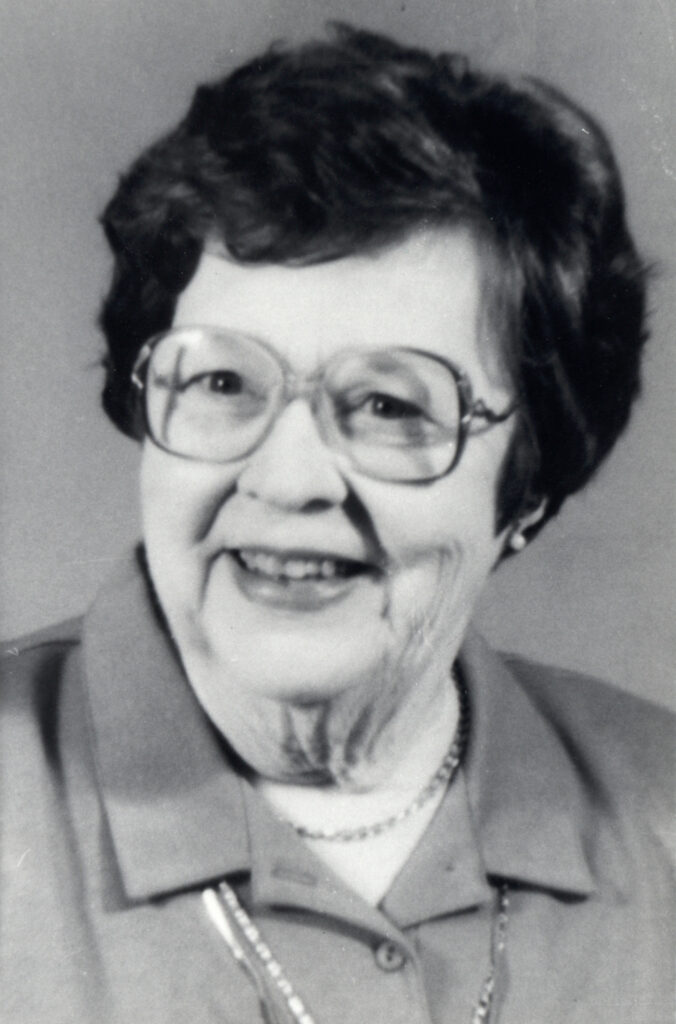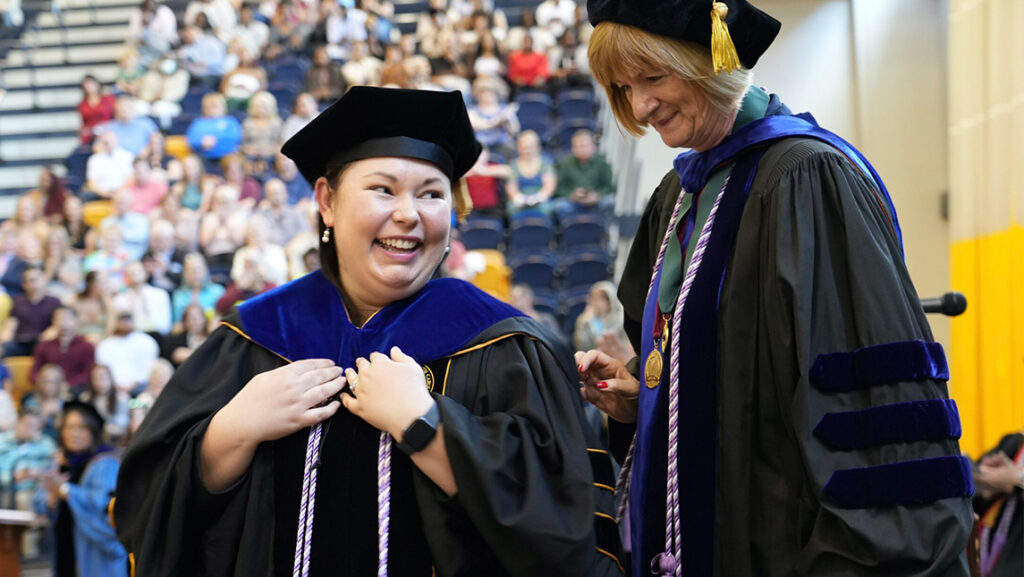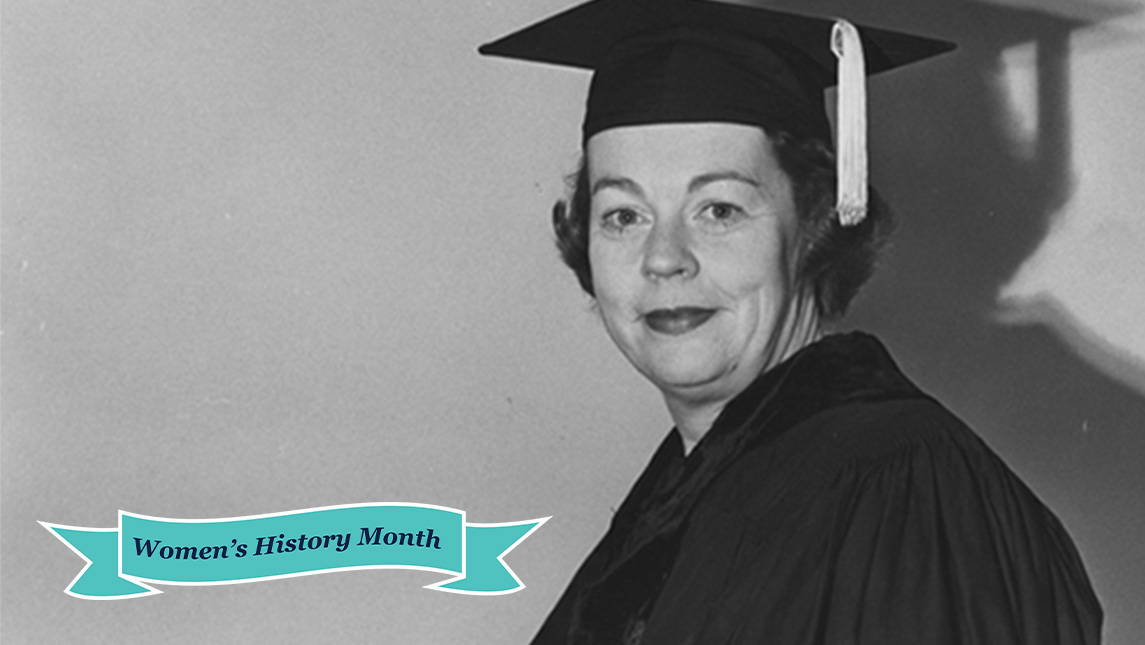One – and only one – PhD was awarded at UNC Greensboro between its founding in 1891 and the end of the Woman’s College era in 1963, a span of about 70 years. That honor belongs to the late Dr. J. Nancy White ’46 – making her the first woman to earn a PhD at what would become UNCG.
The Statesville, North Carolina native was eight years old when her father died unexpectedly. An only child, she and her mother, Josie, enjoyed a close mother/daughter and best friend relationship, which would have a profound effect on the young girl’s future. At Woman’s College she majored in education. It was a career track that was baked into her DNA: her mother and seven aunts were all teachers. And because of her childhood experiences, White also held a deep-seated belief that parents, teachers, and other adults serve as models for youngsters and have an immeasurable impact on their development.
After completing her undergraduate degree at WC, White taught first grade in Salisbury, North Carolina., before returning to the College in 1951 to teach at Curry School, the on-campus teacher training school established in 1892. According to White’s oral history interview in UNCG’s Archives, her earning that first PhD nearly didn’t happen.
FROM PUPIL TO Pioneer
In Spring 1961, Dr. Naomi Albanese, dean of the School of Home Economics, asked White about her plans for the next academic year. White had earned her MEd at UNC Chapel Hill in 1955 and, feeling the need to move on from WC, replied that she had accepted a position at Florida State. Albanese then revealed an upcoming new program that would offer a doctorate in child development.
White took up Albanese’s offer of an assistantship, and, along with five or six others, enrolled in the graduate-level Child Development and Family Relations Program as one of its candidates for a PhD. Because she was the only one to complete the program, she thus earned the first PhD at Woman’s College, one month before it became UNCG in July of 1963. At the time, WC had neither doctoral hoods nor doctoral diplomas, so White’s had to be “borrowed” from UNC-Chapel Hill.



White remained at UNCG to complete her 38-year tenure in the Schools of Education and Human Environmental Sciences, where she played a large part in initiating a joint certification program for early childhood and child development. She immersed herself in teaching, advising, and research at the undergraduate and graduate levels and was appointed administrator of the undergraduate program in child development. In addition to her academic responsibilities, she served on and chaired many departmental, school, and University committees, as well as at state, regional, and national levels.
White’s work was recognized in 1970 with the Alumni Teaching Excellence Award for senior faculty at the University. Prior to this, she was tapped as an honorary member of Golden Chain and inducted into Omicron Nu, the National Home Economics Honor Society. In 1986, she received the Gladys Strawn Bullard Award for leadership and service to the University, and five years after her 1988 retirement, she received the Alumni Distinguished Service Award.
WHITE’S LEGACY
Although Dr. White passed away in 2007, her legacy endures at UNCG. The Josie Nance White Fellowship was established in her honor by Dr. Albanese in 1986 and has since been awarded to 24 doctoral students studying human development and family studies or early elementary education curriculum and teaching. Also, established by White’s friends, former students, and colleagues in 1991, the Dr. Nancy White Undergraduate Scholarship Fund has awarded more than $95,000 to students majoring in child development and family relations.
Along with family and friends, White contributed funding for the Mrs. Earle G. White (Josie N.) Scholarship Endowment to honor her mother and the contributions Josie made as a teacher for almost 60 years. To date, 19 education majors have received awards totaling more than $30,000. And in 2009, White’s career and accomplishments were recognized by friends Charles and Sas Welborne with The Spirit of J. Nancy White Faculty Award Program in what is now the School of Health and Human Sciences. The award helps to create opportunities that strengthen the bond between faculty and students, something White did again and again.



Dr. White’s accomplishments have helped open the doors for other women with doctoral degrees. In 2008, Dr. Daria Kring became the first graduate of the School of Nursing’s doctoral program. A three-time alumna of the School of Nursing, Kring was part of an inaugural 10-student cohort pioneering UNCG’s effort to advance the nursing discipline through scholarly inquiry and research. Then, in 2023, Dr. Carrie Doss became the 100th student to successfully defend her dissertation, with Dr. Kring serving on the dissertation committee.
“We were both so excited that she was the first to graduate, and I was the 100th to defend,” says Doss. “It was a big milestone–one that was just icing on the cake for the day. Maybe I can sit on the committee for the 200th graduate!”
Alumna and current doctoral student Youselene Beauplan ’22 MS, a Minerva Scholar, is enrolled in UNCG’s five-year combined program, earning her master’s degree in human development and family studies in 2022. She expects to earn her doctorate by 2025. Her passion for studying the emotion socialization of black youth connected her with Dr. Jocelyn Smith Lee, assistant professor of human development and family studies, whose own work investigates issues of trauma, violence, loss, and healing among Black boys, men, and families.
“A PhD will provide me the flexibility to serve in different capacities,” Beauplan says. “I want to work directly with youth, their families, and communities. I want to conduct research and do program evaluation and policy work. I see myself finding a place at the intersection of scholar, practitioner, and advocate because having a social justice lens is important.”
Beauplan was invited to collaborate on Dr. Smith Lee’s In All Ways Human project, funded by the Gates Foundation and Robert Wood Johnson Foundation. This narrative change campaign relies on various mediums of storytelling to transform the ways in which Black boys and men are seen by disrupting dehumanizing narratives and reclaiming their humanity.
The impact of UNCG’s doctorate-level academics is also felt at the grade school level, with Dr. Whitney Oakley ’11. She earned her doctorate in educational leadership at UNCG before being named the superintendent of Guilford County Schools. The school district’s first “homegrown” superintendent now oversees 68,000 students, and she credits UNCG with making her a better leader.
Oakley is excited about the possibilities from the University’s close ties to the school district, saying, “There are so many people that work in Guilford County Schools that have worked with UNCG. And there are so many people that work at UNCG that have connections to Guilford County Schools. It’s a very strong connection. I think in terms of the partnerships, so far, the biggest one has been the tutoring. And then we have the math teachers of tomorrow. So, we’ve got some very specific teacher pipeline efforts that are happening.”
Story by Christine Garton, University Advancement; and Avery Craine Powell, University Communications
Photography courtesy of the University Archives Photograph Collection, University Archives and Manuscripts
Additional photography by Sean Norona, University Communications; and courtesy of Guilford County Schools and UNCG School of Nursing



